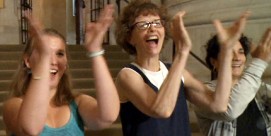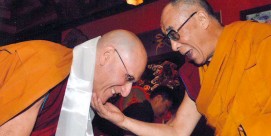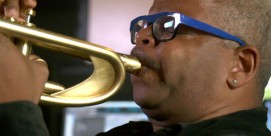In This Episode << SLIDE LEFT TO SEE ADDITIONAL SEGMENTS
Exploring Religious America, Part Four: Spirituality
BOB ABERNETHY, anchor: Now, part four of our series EXPLORING RELIGIOUS AMERICA. Today, the broad interest in spirituality — within churches and apart from them.
According to the Gallup organization, between 1984 and 1998 there was a phenomenal jump in the number of people who said they felt a need for greater spiritual growth — from 56 percent to 82 percent, in just 14 years.
In our RELIGION & ETHICS NEWSWEEKLY poll, conducted last month with U.S. NEWS & WORLD REPORT, we asked people whether they think belief or individual spiritual experience is the most important part of religion. Almost 70 percent of Christians said individual spiritual experience.
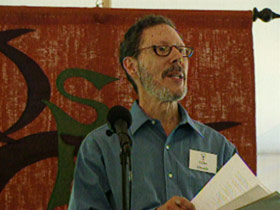
The word “spirituality” refers to such experience, especially, for many people, awareness of the presence of God.
Tilden Edwards, an Episcopal priest who founded the Shalem Institute for Spiritual Formation in Washington, D.C., gives the word a wider meaning.
Reverend TILDEN EDWARDS (Shalem Institute for Spiritual Formation): It has to do with the way we probe and respond to that deepest yearning in us for the infinite, for that which is more than all the finite things that life gives us, It is, I think, part of our intrinsic human nature to have this longing for something more.
ABERNETHY: In the Catholic mass, the Eucharist is a profound spiritual experience for many Catholic worshippers. Evangelical Protestants and Pentecostals say they often experience the presence of the Holy Spirit in prayer and praise. Many mainline Protestants say they are moved by great preaching and music and scripture. But in recent years, some traditional Protestants have also wanted a deeper sense of God’s presence.
Rev. EDWARDS: I think almost all Protestant executives, clergy, and many lay people would say that, indeed, something has been missing for us in terms of assisting us with a direct, immediate relationship to God. There’s been an imbalance, you know, between the head and the heart that’s being rectified, I think, in all traditions.
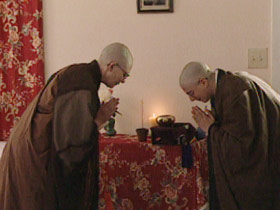
ABERNETHY: So, while not leaving their own worship traditions, some Protestants and others have sought out the ancient spiritual practices of Asian religions, of Roman Catholicism, and of the Eastern Orthodox.
Seekers are exploring the chants of Catholic monks — and Catholic sacred reading. Some learn to pray with the icons of the Eastern Orthodox; or to be more mindful while doing Buddhist slow walking; or to seek clarity through the physical exercises of yoga.
Most commonly, new spiritual seekers gather in small meditation groups to learn to become more aware of the sacred, and they do this, often, with the help of trained spiritual directors. Many Protestants also have discovered quiet spiritual retreats, often at Catholic retreat centers.
Simultaneously, especially in the Far West, people who are not part of any church have pieced together elements from many traditions to create spiritual practices of their own. A common expression is, “I am spiritual, but not religious.”
Also, experts say, as assorted spiritual teachers have emerged, along with an enormous number of new spiritual books, organized religion lost its monopoly over spirituality.
BOB ABERNETHY: A closer look now at the similar experiences of spiritual seekers both apart from organized religion and within it. Lucky Severson begins his report on Orcas Island in the state of Washington.
LUCKY SEVERSON: How do you hear God? In messages? How?
MARILYN MCGUIRE: Well I think in all kinds of ways we hear God. The wind blows and I hear God. I hear a bird sing in the morning. I hear a baby cry. You know, I see your smile.
LUCKY SEVERSON: Some people take a walk and only get exercise. Marilyn McGuire gets rejuvenated physically and spiritually. She communes with nature as if she were at an altar.
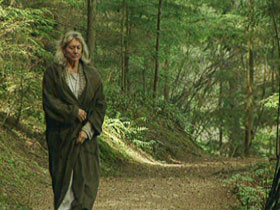
Ms. MCGUIRE: The altar is kind of in the mind, the consciousness and sacredness of life is with everything we do. It isn’t just part of some ceremony that happens once a week.
SEVERSON: It is, no doubt, easier for her to commune with nature considering where she lives, how she lives, among the tall pines in the San Juan Islands, in the state of Washington. She came here alone 20 years ago, divorced, her kids grown. Now she’s a grandmother. A far cry and a long distance from Alabama, where she was a well-connected state chairwoman of the Nixon for President campaign. She attended church regularly, but she was not fulfilled.
Ms. MCGUIRE: It was like, I am being told the wrong story by well intended people. But I knew there was more to the meaning of life. And more to relationships, and more to everything.
SEVERSON: Life took on a special meaning when she got meningitis and almost died.
Ms. MCGUIRE: I had horrible headaches, terrible, terrible pain with this meningitis. And at one point, I was out of my body looking down on my body. It was a strange thing and a very peaceful sensation. It would have been really okay to have just gone, because it was total peace. Somehow I was not able to leave. So, suddenly, life took on more importance to me and the way I lived my life.
SEVERSON: Today Marilyn McGuire lives her life the way an increasing number of Americans would like to live theirs — becoming more spiritual, but not necessarily through organized religion. She started studying eastern philosophy and yoga which helps her relax into the silence of meditation, which she now does religiously.
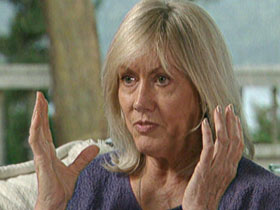
Ms. MCGUIRE: Eventually you will still your mind, you will still your body, and you will still your heartbeat. And in that still place you can’t be angry. In that still place you are thinking nice thoughts for the most part.
SEVERSON: Nothing spiritual in that?
Ms. MCGUIRE: Well it depends. Because in the still mind, God speaks. You can’t hear God. You can’t hear the voice if your mind is so busy with it’s own thoughts. So if you want to hear this voice of God or whatever it is you call this higher power, then it is important to listen and to be still.
SEVERSON: Nowhere is the lack of organized religion more pronounced than here in the state of Washington. According to a recent survey, one out of four Washingtonians say they have no religion at all. And fewer than half say anyone in their family is affiliated with a church. With more and more inspirational literature on the market we are becoming a nation of independent spiritual seekers, more inclined to be guided by our own experience than what we hear from the pulpit.
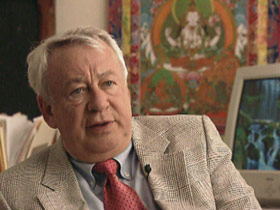
Dr. WADE CLARK ROOF (Professor, University of California, Santa Barbara): I think our trust in the clergy is to a considerable extent affected by the decline of trust more generally. I think it began particularly in the 1960s, the 1970s, and it was first noticed in the decline of trust in the political authority.
SEVERSON: Professor Roof has written a book about the trend away from organized religion called, SPIRITUAL MARKETPLACE: BABY BOOMERS AND THE REMAKING OF AMERICAN RELIGION. Some observations:
Dr. ROOF: Many spiritual seekers perceive organized religion as narrow-minded, closed-minded, not open to their doubts, their questions about life. I do think that the sense of stress that so many people today feel is clearly related to the search for trying to find some quiet time.
SEVERSON: Meanwhile, people in traditional churches are searching for meaning and a more personal connection with God in new ways. Some find it in the rituals of eastern religions. Others in the ancient practices of Catholicism. But Pastor Thomas Williamsen of the Gloria Dei Lutheran Church outside Annapolis, Maryland says many churches haven’t responded to this need.
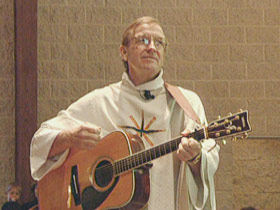
Reverend THOMAS WILLIAMSEN (Pastor, Gloria Dei Lutheran Church): I think that everybody is somewhat on some holy quest. Built into each person is an ancient longing and a yearning to belong. The Church sometimes gets so tied up into controlling what people believe that they forget religion really is about a relationship with God. And so the church has not taken that quest seriously.
SEVERSON: Not many years ago, Pastor Williamsen might have been considered a renegade.
Rev. WILLIAMSEN: I was never really satisfied with just the traditional understanding about who God was. Although I am Lutheran down to my toes theologically, there is something more than just a theological understanding about who God is.
SEVERSON: The pastor says he didn’t know he was on a search until he went away to a retreat. And at the retreat, he learned about silence.
Rev. WILLIAMSEN: In the silence something special happened on that retreat. I know this is goofy, but I felt God’s presence in a way that I never had before.
SEVERSON: He says some members of his congregation still think he’s goofy, especially now that he offers members a weekly evening service of centering prayer, what others might call chanting and meditation. He demonstrates the chanting with the church’s pastoral counselor Susan Coale.
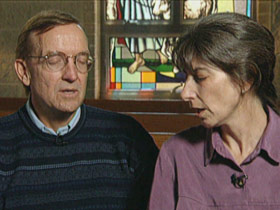
Rev. WILLIAMSEN: Now if you sing that for four or five minutes, it starts to slow you down and quiet you just a little bit. The chant just helps ready ourselves for the silence and for the quiet.
SEVERSON: A newcomer to the pastor’s centering prayer service might wonder if this was the wrong church. But the members who come say it has enriched their lives.
PAT MOSER: It really centers you and makes you feel whole and complete again.
CHAD CLAPSADDLE: If I miss it for one reason or another my week isn’t the same. It’s a really wonderful chance to sit and relax and be in God’s presence.
Rev. WILLIAMSEN: Somehow when you are done you feel touched by an energy that I will call God. And I think that is true of mediators throughout the world. Everyone in that silent, deep place is touched by the same reality, that when we are finally able to silence ourselves, God is able to touch us in a very deep and meaningful place.
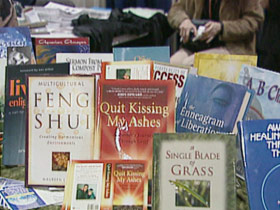
SEVERSON: For many Americans, seeking spirituality is a natural progression from the culture of self-improvement and therapy.
Prof. ROOF: I think there is probably a relationship between a therapeutic culture and spiritual seeking. We are in a culture that is deeply therapeutic in the sense that we seek to find ways that our own sense of self can be enhanced in our work, in our marriages, in our families.
SEVERSON: Maybe that’s why spirituality has become such a big business. Take a look at the exhibits and reading material at this huge book Expo in New York. It’s why Marilyn McGuire started a non-profit company several years ago marketing books and products that promote spiritual growth and environmental values.
SEVERSON: What are people like you searching for?
Ms. MCGUIRE: I think to be vital and alive and well. And it is not the me, me, me, and my, my, you know, selfish kind of thing. It is so that we can carry on the work we do. So we can be better parents to our children and grandchildren and so we can take better care of one another.
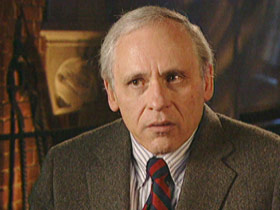
SEVERSON: Taking care of one another may not be the prevailing image of the so-called me-generation of spiritual seekers, but the prevailing image of being self-absorbed and selfish may not be correct.
Dr. ROBERT WUTHNOW (Sociologist, Princeton University): We found that many people who have been maybe first of all praying and meditating and trying to discover some form of spirituality that helped them were then led almost naturally to serve other people, sometimes in very dramatic ways.
Ms. MCGUIRE: It’s not all about me, but the only person that we are really responsible for is ourselves. You know people, the ministers of the church and others, are trying to take care of you and me and a whole flock of people. But it’s got to begin here.
SEVERSON: What Marilyn McGuire has found here, Pastor Thomas Williamsen hopes and prays, sometimes in silence, that other spiritual seekers will find, here. I’m Lucky Severson in Arnold, Maryland.
BOB ABERNETHY: Many religious leaders have been highly critical of the kinds of spiritual exploration — in church and out — that is, in their view, self-centered, shallow, and unconcerned about the needs of others.
Phyllis Tickle is a religion writer and editor in Tennessee.
PHYLLIS TICKLE (Contributing Religion Editor, PUBLISHERS WEEKLY): It asks nothing, makes no demands. You can live in that only so long before its sheer sweetness will kill you. It’s like eating too much icing.
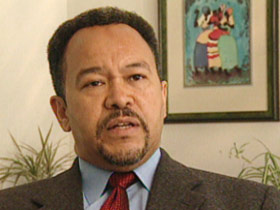
ABERNETHY: Robert Franklin is President of the Interdenominational Theological Center in Atlanta.
Reverend ROBERT FRANKLIN (President, Interdenominational Theological Center): There are messages in all of the great religious faiths that remind us that suffering is part of the human experience and has to be grappled with. That death and mortality are realities. And today’s popular culture and too much of today’s superficial religion simply seeks to avoid that entire dimension of human experience.
ABERNETHY: On the other hand, spiritual practitioners independent of traditional religion insist that their outlook is both God-centered and compassionate. Marianne Williamson is a popular writer and speaker on spirituality.
MARIANNE WILLIAMSON (Author, A RETURN TO LOVE): As we find our closer connection to God we naturally discover our enthusiasm and our desire for service to others, so when you turn your attention to God you by definition turn your attention to love of people because that is God’s first law.
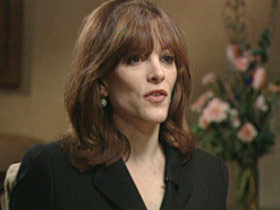
ABERNETHY: Seekers outside the Church and those within often differ over how to name the object of their search — the traditional God, or something more impersonal. Nevertheless, historian of religion Martin Marty sees spiritual seekers and traditional churches on converging paths.
Dr. MARTIN MARTY (Religion Historian and Professor Emeritus, University of Chicago): All of a sudden we find that both the secular world and the already religious world are moving into a whole new understanding. They simply aren’t satisfied by the meanings they get from daily practical life. They think there must be some bigger story. And that they have to experience that bigger story. And they’re going to find it somewhere. If their own church doesn’t do it they’re going to find it at a mega bookstore, they’re going to find it at summer retreats or weekend retreats or whatever. And, of course, the churches have adapted greatly and they have gone into much more of an experiential and exuberant approach to worship.
ABERNETHY: That’s our report on spirituality — in churches and outside them: part four in our series “Exploring Religious America.” Next week, a look back at the major questions that grow out of the reports in our series so far.


